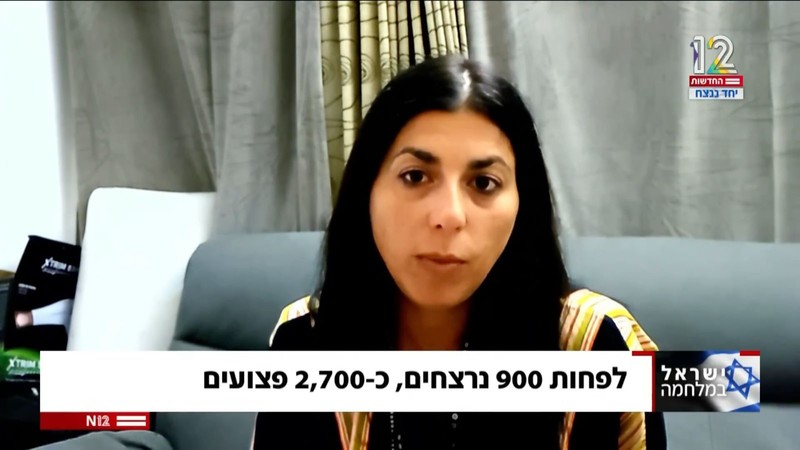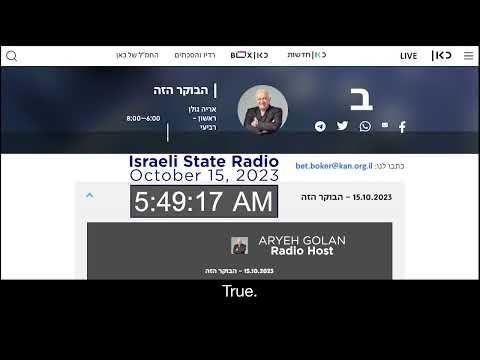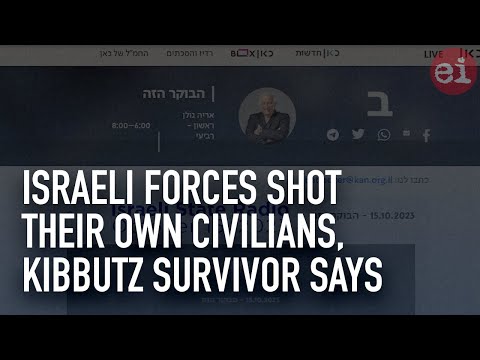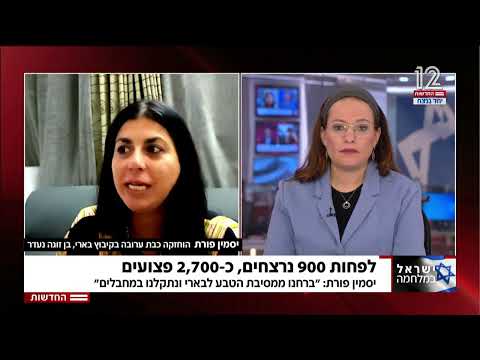Ali Abunimah and David Sheen The Electronic Intifada 16 October 2023

Update, 23 October
The Electronic Intifada is now able to publish the entire interview with Yasmin Porat, the Kibbutz Be'eri survivor who told Israeli radio that Israeli security forces "undoubtedly" killed a large number of their own civilians following the Hamas assault on 7 October.
When this article was originally published on 15 October, a recording of the interview was not available on the website of Israeli state broadcaster Kan and was not included in the online edition of Haboker Hazeh for that day, the program that interviewed Porat.
Following the publication of this article, the full interview was uploaded by Kan. It includes several extra minutes that were edited out of the version of the interview that we had originally obtained and translated.
In the full-length interview, Porat states that the Palestinian fighters - who she says treated her and the other Israeli civilians "humanely" - intended to "kidnap us to Gaza. Not to murder us."
She adds that "after we were there for two hours with the abductors, the police arrive. A gun battle takes place that our police started."
You can listen to the full interview with English subtitles here in the video below. A full transcript is at the bottom of this page.
Also of note is that Mondoweiss on 22 October published a story based on accounts in Israeli media indicating that Israeli forces were responsible for many Israeli civilian and military deaths following the 7 October Palestinian offensive.
This includes the shocking revelation that some Israeli civilians were alive for up to two days before Israeli forces killed them, along with Palestinian fighters who were holding them.
Israel's Haaretz newspaper on 20 October published an interview - only in its Hebrew edition - with a man called Tuval who lived in Kibbutz Be'eri, but who was away on 7 October. Tuval's partner was however killed in the events.
Haaretz reports: "According to him [Tuval], only on Monday night and only after the commanders in the field made difficult decisions - including shelling houses with all their occupants inside in order to eliminate the terrorists along with the hostages - did the IDF [Israeli army] complete the takeover of the kibbutz. The price was terrible: at least 112 Be'eri people were killed. Others were kidnapped. Yesterday, 11 days after the massacre, the bodies of a mother and her son were discovered in one of the destroyed houses. It is believed that more bodies are still lying in the rubble."
This testimony would seem to indicate that many Israeli captives were still alive on Monday, 9 October, Mondoweiss observes, a full two days after the events of Saturday, 7 October.
"While it might be understandable if captives had been killed in the hectic crossfire of an initial Israeli response to the attack on the 7th, this account would seem to indicate that the decision to assault the kibbutz and everyone inside was made as a clear military calculation," Mondoweiss adds.
Here's the interview with Yasmin Porat:
Original article
An Israeli woman who survived the Hamas assault on settlements near the Gaza boundary on 7 October says Israeli civilians were "undoubtedly" killed by their own security forces.
It happened when Israeli forces engaged in fierce gun battles with Palestinian fighters in Kibbutz Be'eri and fired indiscriminately at both the fighters and their Israeli prisoners.
"They eliminated everyone, including the hostages," she told Israeli radio. "There was very, very heavy crossfire" and even tank shelling.
The woman, 44-year-old mother of three Yasmin Porat, said that prior to that, she and other civilians had been held by the Palestinians for several hours and treated "humanely." She had fled the nearby "Nova" rave.
A recording of her interview, from the radio program Haboker Hazeh ("This Morning") hosted by Aryeh Golan on state broadcaster Kan, has been circulating on social media.
The interview has been translated by The Electronic Intifada. You can listen to it with English subtitles in this video and a transcript is at the end of this article:
Notably, the interview is not included in the online version of Haboker Hazeh for 15 October, the episode in which it apparently aired.
It may well have been censored due to its explosive nature.
Porat, who is from Kabri, a settlement near the Lebanese border, undoubtedly experienced terrible things and saw many noncombatants killed. Her own partner, Tal Katz, is among the dead.
However, her account undermines Israel's official story of deliberate, wanton murder by the Palestinian fighters.
Although it no longer appears on the Kan website, there can be little doubt about the recording's authenticity.
At least one Hebrew-language account posted part of the interview on Twitter, now officially called X, and accused Kan of functioning as "media in the service of Hamas."
Porat also gave her account to the Israeli newspaper Maariv.
However, the Maariv story, published on 9 October, makes no specific mention of civilians being killed by Israeli forces.
And in a half-hour interview with Israel's Channel 12 on Thursday, Porat speaks of intense gunfire after Israeli forces arrived. Porat herself received a bullet in the thigh.
Treated "humanely"
Not only does Porat tell Kan that Israelis were killed in the heavy counterattack by Israeli security forces, but she says she and other captive civilians were well treated by the Palestinian fighters.
Porat had been attending the "Nova" rave when the Hamas assault began with missiles and motorized paragliders. She and her partner Tal Katz escaped by car to nearby Kibbutz Be'eri where many of the events she describes in her media interviews took place.
According to Porat speaking to Maariv, she and Katz initially sought refuge in the house of a couple called Adi and Hadas Dagan. After the Palestinian fighters found them they were all taken to another house, where eight people were already being held captive and one person was dead.
Porat said that the wife of the dead man "told us that when they [the Hamas fighters] tried to enter, the guy tried to prevent them from entering and grabbed the door. They shot at the door and he was killed. They did not execute them."
"They did not abuse us. They treated us very humanely," Porat explained to a surprised Golan in the Kan radio interview.
"By that I mean they guard us," she said. "They give us something to drink here and there. When they see we are nervous they calm us down. It was very frightening but no one treated us violently. Luckily nothing happened to me like what I heard in the media."
"They were very humane towards us," Porat said in her Channel 12 interview. She recalled that one Palestinian fighter who spoke Hebrew, "told me, 'Look at me well, we're not going to kill you. We want to take you to Gaza. We are not going to kill you. So be calm, you're not going to die.' That's what he told me, in those words."
"I was calm because I knew nothing would happen to me," she added.
"They told us that we would not die, that they wanted to take us to Gaza and that the next day they would return us to the border," Porat told Maariv.
In the Channel 12 interview, Porat elaborates that although the Palestinian fighters all had loaded weapons, she never saw them shoot captives or threaten them with their guns.
In addition to providing the captives with drinking water, she said the fighters let them go outside to the lawn because it was hot, especially as the electricity was cut.
Young and scared
About eight hours after the start of the Hamas attack and about half an hour after Porat's calls to the police, Israeli forces arrived and chaos ensued, Porat told Kan.
"At first there was no [Israeli] security force with us," Porat recalled, noting that her first call to the Israeli police went unanswered. "We were the ones who called the police, together with the abductors because the abductors wanted the police to arrive. Because their objective was to kidnap us to Gaza."
"They understand that soldiers will not kill hostages. So they want to come out with us alive and for the police to permit it," Porat told Channel 12.
Though the Israeli captives numbered only a dozen, Porat was instructed to tell Israeli police that 40 of them were being held by the Hamas fighters, who themselves numbered between 40 and 50 men mostly in their 20s, by Porat's estimate. They themselves were young and scared, she told Channel 12.
A fighter Porat described as a commander in his 30s asked to speak to the police and was put on with an Arabic-speaking Israeli officer.
After their brief conversation, the four dozen or so Palestinian fighters and their dozen Israeli prisoners awaited the arrival of the army, with some of the group spilling outside to the garden for relief from the afternoon heat.
Hails of bullets, mortars and tank shells
Israeli forces announced their arrival with a hail of gunfire, catching the fighters and their Israeli captives by surprise.
"We were outside and suddenly there was a volley of bullets at us from the [Israeli unit] YAMAM. We all started running to find cover, Porat told Channel 12."
Porat said she surrendered to the Israeli soldiers half an hour into the fierce gun battle that consisted of "tens and hundreds and thousands of bullets and mortars flying in the air," and that one of the Palestinian fighters, a commander, decided to surrender and used her in effect as a human shield.
"He starts to disrobe," Porat recalled to Kan's Aryeh Golan. "He calls to me and he starts to leave the house with me, under fire. At that time I yell to the [Israeli commandos]... when they can hear me, to stop firing."
"And then they heard me and stopped firing," she added. "I see people from the kibbutz on the lawn. There are five or six hostages lying on the ground outside. Just like sheep to the slaughter, between the shooting of our commandos and the terrorists."
"The terrorists shot them?" Golan asks.
"No, they were killed by the crossfire," Porat responds. "Understand there was very, very heavy crossfire."
Golan presses: "So our forces may have shot them?"
"Undoubtedly," the former captive responds, and adds, "They eliminated everyone, including the hostages because there was very, very heavy crossfire."
"After insane crossfire, two tank shells were shot into the house. It's a small kibbutz house, nothing big," Porat explains.
Porat and the man who took her captive both survived. The Palestinian was taken prisoner by Israeli forces. But according to Porat, almost everyone else in the settlement was killed, wounded or missing, believed to have been taken to Gaza.
Porat told Kan she lost dozens of friends who had been at the rave - people she would regularly see at parties in Israel's trance scene.
"I'm angry at the state, I'm angry at the army," Porat told Maariv. "For 10 hours the kibbutz was abandoned."
The joint American-Israeli effort to paint Hamas as worse than ISIS in order to justify Israel's unfolding genocide against the civilian population in Gaza depends on the international public not seeing or hearing accounts like Porat's.
Israeli leaders, already under intense criticism for failing to anticipate and prevent the Hamas offensive, will also not want their catastrophic failures to be compounded by knowledge that many of the Israelis who died may well have been killed by "friendly fire" in a disastrous Israeli counterattack.
Hannibal Directive?
Saleh al-Arouri, a senior Hamas military commander, has directly addressed Israel's claims that his fighters set out to deliberately kill as many civilians as possible.
The Israeli propaganda campaign has included lurid atrocity tales - for which no evidence has been produced whatsoever - that Palestinians beheaded dozens of Israeli babies and that women were raped.
Al-Arouri said in an interview with Al Jazeera on Thursday that fighters of his organization's military force, the Qassam Brigades, were under strict protocol to not harm civilians.
But al-Arouri said that after Israel's Gaza division - the army unit that surrounds the Gaza Strip - collapsed much more quickly than expected, people in Gaza rushed to the boundary area after learning it had been opened, causing chaos. He said this may have included other armed persons who were not part of Qassam.
Al-Arouri said that this caused Qassam fighters to engage with soldiers, settlement guards and armed residents, which led to civilian deaths.
Al-Arouri also invoked the possibility Israel used the so-called Hannibal Directive - a protocol that allows Israeli forces to use overwhelming force to kill one of their own captured soldiers rather than allow them to be taken prisoner.
The rationale for the Hannibal Directive is to avoid allowing an enemy to have captives that can be used in prisoner exchange negotiations.
However in this case, if the directive was implemented by Israeli forces, it would have been used against civilians.
Al-Arouri told Al Jazeera, "We are certain that young men [fighters] were bombed along with the prisoners who were with them."
Porat's account, among others, underscores the need for an independent investigation, one which Israel is unlikely ever to permit.
The current propaganda narrative is simply too valuable to the genocidaires in Tel Aviv.
Ali Abunimah is executive director of The Electronic Intifada.
David Sheen is the author of Kahanism and American Politics: The Democratic Party's Decades-Long Courtship of Racist Fanatics.
Transcript of the Kan interview with Yasmin Porat
Aryeh Golan: Now we have with us Yasmin from Kibbutz Kabri. Shalom Yasmin.
Yasmin Porat: Shalom good morning.
Aryeh Golan: You were at that nature party that turned into a butchery party.
Yasmin Porat: True.
Aryeh Golan: You were even a hostage for two and a half hours held by Hamas terrorists.
Yasmin Porat: True. After the party, my partner and I fled to - we ended up at - we got stuck at Kibbutz Be'eri, looking for cover when we didn't realize terrorists had penetrated. Basically, we sought protection from the Qassams [rockets].
Aryeh Golan: Yes.
Yasmin Porat: We knocked on the door of a really sweet couple, the Dagans, Hadas and Adi, and they took us in, to their reinforced security room. We were in the reinforced security room with them for between six to eight hours. Under great fear, because we knew there was a penetration of about 100 terrorists in the kibbutz. And the gunshots could be heard from every direction. Until we got to the phase when that couple informs us that the terrorists are right in the house next door. And it seems they will reach us. And in fact not five minutes later the whole house shatters to pieces. And for an hour we manage to prevent them from breaking into our reinforced security room. And for an hour about 10 terrorists are banging on the reinforced safe room. Screams in Arabic. It was a very tense hour. And we felt great indescribable fear. After an hour they managed to break in and they removed the four of us to a nearby house where there were already eight other additional hostages. We joined those eight and we were about 12 hostages with 40 terrorists that were guarding us. I'm keeping the story short.
Aryeh Golan: Did they abuse you?
Yasmin Porat: They did not abuse us. They treated us very humanely, meaning...
Aryeh Golan: Humanely? Really?
Yasmin Porat: Yes, by that I mean they guard us. They give us something to drink here and there. When they see we are nervous, they calm us down. It was very frightening but no one treated us violently. Luckily nothing happened to me like what I heard in the media.
Aryeh Golan: Horrible, horrific things occurred.
Yasmin Porat: True. But after two hours, briefly, at first there was no [Israeli] security force with us. We were the ones who called the police together with the abductors because the abductors wanted the police to arrive. Because their objective was to kidnap us to Gaza. Not to murder us.
Aryeh Golan: Mm hm.
Yasmin Porat: And after we were there for two hours with the abductors, the police arrive. A gun battle takes place that our police started. A very very difficult gun battle, in terms of the amount of ammunition that flew there. And at the end... no, during [the battle], one of the terrorists decides to surrender, the terrorist I made a connection with. Over the course of those two hours I connected with some of the abductors, those that guarded the hostages.
Aryeh Golan: Yes
Yasmin Porat: And he decides to use me as a human shield. He decides to surrender. I am not aware of it in those moments, it's in retrospect. He starts to disrobe, he takes - he calls to me and he starts to leave the house with me, under fire. At that time I yelled to the YAMAM [Israeli commandos] when we were already - when they can hear me, to stop firing.
Aryeh Golan: Yes
Yasmin Porat: And then they hear me and stop firing. I see on the lawn, in the garden of the people from the kibbutz. There are five or six hostages lying on the ground outside, just like sheep to the slaughter, between the shooting of our [fighters] and the terrorists.
Aryeh Golan: The terrorists shot them?
Yasmin Porat: No, they were killed by the crossfire. Understand there was very, very heavy crossfire.
Aryeh Golan: So our forces may have shot them?
Yasmin Porat: Undoubtedly.
Aryeh Golan: When they tried to eliminate the abductors, Hamas?
Yasmin Porat: They eliminated everyone, including the hostages. Because there was very, very heavy crossfire. I was freed at approximately 5:30. The fighting apparently ended at 8:30. After insane crossfire, two tank shells were shot into the house. It's a small kibbutz house, nothing big. You saw it on the news.
Aryeh Golan: Yes
Yasmin Porat: Not a large place. And at that moment everyone was killed. There was quiet, except for one survivor that came out of the garden, Hadas.
Aryeh Golan: How were they all killed?
Yasmin Porat: From the crossfire.
Aryeh Golan: Crossfire, so it could also be from our forces?
Yasmin Porat: Undoubtedly.
Aryeh Golan: Really?
Yasmin Porat: That's what I believe.
Aryeh Golan: Oy it sounds so bad.
Yasmin Porat: Yes. And everyone died.
Aryeh Golan: And you, thanks to that terrorist who decided to give himself up...
Yasmin Porat: Exactly.
Aryeh Golan: And you survived and all the rest were killed there.
Yasmin Porat: Except for one other woman who survived, they found her later [trails off]. The person who dealt with the event checked her or something. They found her when she lifted her head, amongst all the bodies. And then, simply...
Aryeh Golan: And your partner, who was with you?
Yasmin Porat: Killed.
Aryeh Golan: He was killed too?
Yasmin Porat: Yes. Everyone was killed there. Just horrible.
Aryeh Golan: Have you returned to Kabri?
Yasmin Porat: I returned to Kabri and then the chaos started there.
Aryeh Golan: In the north?
Yasmin Porat: Yes. So now I'm a guest. I'm being hosted in a lovely way in Kibbutz Ein Harod. And I'm here for now.
Aryeh Golan: You're in the [Jezreel] Valley now. Alright, Yasmin, you've undergone a horrific experience.
Yasmin Porat: True.
Aryeh Golan: You lost your partner, you saw people killed alongside you.
Yasmin Porat: And I...
Aryeh Golan: [INTERRUPTS] What happened to that terrorist who gave himself up?
Yasmin Porat: He is still arrested, and he was just called in for interrogation to help... You know, he will be interrogated about the accused. And sadly dozens more of my friends were killed because...
Aryeh Golan: [INTERRUPTS] Dozens of friends?
Yasmin Porat: Yes because it's a community, the trance scene, we go to the same parties. It means that besides my partner, I knew dozens and hundreds of friends, and every day I learn that at least 10 of my friends have died. So I don't even know how to digest this situation.
Aryeh Golan: It's very difficult to digest because this has never happened before.
Yasmin Porat: True, exactly that.
Aryeh Golan: All the best to you Yasmin.
Yasmin Porat: Thank you very much.
Aryeh Golan: Hold it together.
Yasmin Porat: Thank you, thank you.
Aryeh Golan: After everything you have been through.
Yasmin Porat: Thank you very much. Bye bye.
Aryeh Golan: Bye. 5:53.
Tags



